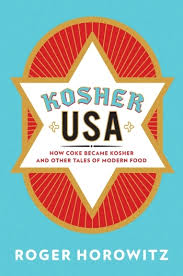Kosher USA author dishes on the industry

Book Review By Amy Spiro, The Jerusalem Post
Walk into just about any supermarket in America and one thing is for sure: Almost half the food on the shelves will be kosher. How did this happen? And who was the driving force behind it? Those are the questions Roger Horowitz seeks to answer in his latest book, Kosher USA: How Coke Became Kosher and Other Tales of Modern Food.
Horowitz will discuss Kosher USA at the Joffe Author Event hosted by Beth Abraham Synagogue and the JCC on Feb. 23. Kosher USA received the 2016 National Jewish Book Award in the category of American Jewish Studies.
His decade of research reveals many insights into the decades during which kosher certification of processed foods blossomed.
He traces the story from the times when kosher homemakers pored over labels and lists of ingredients, to the certification of Coca Cola, one of the earliest mass-produced certified foods.

That is followed by the boom of Jewish-owned companies producing kosher products, through recent decades, when Oreos, Twix and other iconic American foods became available to the observant Jewish public.
Which ingredients had to be switched out to make Coke kosher? Why did it take so long after Oreos removed lard from the recipe to gain rabbinic approval? Horowitz has the answers.
But the story is far from a straightforward climb, as rivalries, scandals and accusations plagued the kashrut business for decades (and some would argue those days are far from over). As industrialization took hold and packaged foods became a staple of every American kitchen, kosher certification became big business, with companies vying for the biggest market share. The Big Four — the OU, Kof-K, Star-K and OK — mostly get along today, but that wasn’t always the case among rival certifying agencies.
One of the most intriguing chapters, The Great Jell-O Controversy, details how feuding rabbinic interpretations led to a fierce debate among agencies — and the general public — over the certification of gelatin. Some authorities, relying on substantial and serious rabbinical backing, ruled that gelatin created from pig bones underwent enough of a physical transformation to become an entirely new product, and could therefore be considered kosher.
But a firestorm around the idea of eating pork led to the rabbinical establishment eventually coalescing to rule pig-based gelatin out of bounds (a position that holds strongly to this day in Orthodox Judaism). Boxes of Jell-O brand fruit gels on supermarket shelves today still bear a “K” mark, though the majority of kosher consumers steer clear.
While the book is entertaining, informative and a mostly fast-paced read, Horowitz includes personal anecdotes and notes throughout, which seem somewhat misplaced in a documentary account.
But more than that, the author seems determined to take sides among the personalities and organizations that populate the book. As he recounts much of the development of the kosher industry over the 20th century, Horowitz clearly paints bad guys and good guys in the story, and often makes it personal.
Though he notes in his ending acknowledgments that Rabbi Menachem Genack, CEO of the Orthodox Union’s kosher division, “asked OU staff to cooperate with my sometimes annoying research requests, which they always did” — in the text of the book itself, he takes him to task.
“He did not make me welcome,” Horowitz writes. “Genack barely looked at me during our perfunctory 15-minute conversation, constantly monitoring his email and mobile phone as I explained my project and asked for the OU’s cooperation.
“While indicating that the OU would respond favorably to my queries, he radiated disapproval… for my evidently non-Orthodox mode of dress and behavior.”
There is much to enjoy and even more to debate in Horowitz’s well-researched and engaging tome; and debate is so much the heart and soul of both kashrut and Jewish life. Anyone with an interest in the world of kosher food will be riveted to parts of the book, as long as they can ignore or agree with Horowitz’s many opinions.
Author Roger Horowitz at the Susan and David Joffe Author Event, hosted by Beth Abraham Synagogue and the JCC on Thursday, Feb. 23 at 7 p.m. at Beth Abraham, 305 Sugar Camp Cir., Oakwood. The program is free. For more information, call the JCC at 610-1555.
To read the complete February 2017 Dayton Jewish Observer, click here.

